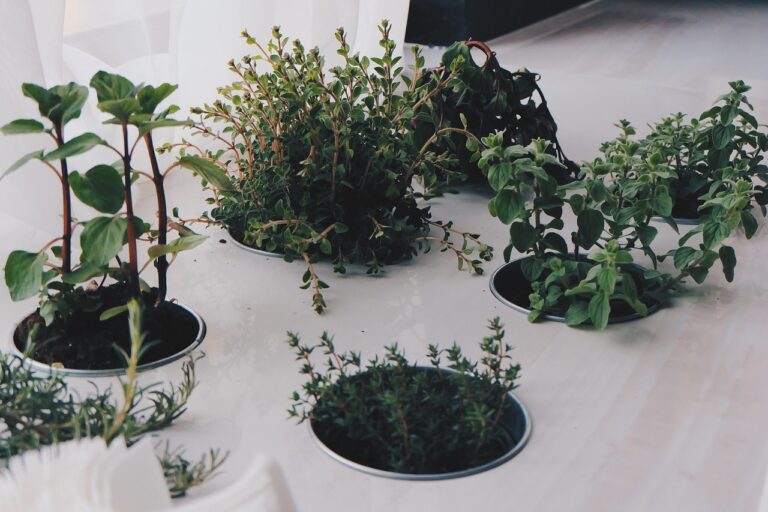Methods for Preserving Herbs: Freezing, Drying, and Making Herb-Infused Oils and Vinegars
Freezing herbs maintains peak freshness; perfect for rosemary, sage, thyme, oregano. Finely chop, freeze in ice cube trays, transfer to freezer-safe bag. Air dry for proper herb preservation; use paper bags for flowers, seeds. Store dried herbs in glass jars, make sure no moisture remains. Infuse oils for flavor extraction; use carriers like almond, olive oil. Herb-infused vinegars enhance dishes with essential oils and flavors. Experiment with different herb combos for unique tastes. Drying, freezing, infusing oils, vinegars enrich culinary experiences with vibrant herb flavors and benefits.
Freezing Herbs for Preservation
When preserving herbs through freezing, it is crucial to think about the type of herb and the method of freezing to maintain peak freshness. Freezing herbs is a fantastic way to preserve their flavor and aroma for extended periods, typically around 6-8 months. Herbs like rosemary, sage, thyme, and oregano are ideal candidates for freezing due to their hardy nature. These herbs freeze well and retain their flavors effectively.
To freeze herbs successfully, consider using ice cube trays. Chop the herbs finely and place them into the compartments of an ice cube tray. Fill each compartment with water or oil to cover the herbs completely. Water is suitable for most herbs, while oil works better for tougher herbs like rosemary and thyme. Once frozen, transfer the herb-filled cubes into a freezer-safe bag for easy storage and use.
Drying Techniques for Herb Preservation
Utilizing proper drying techniques is essential for preserving herbs effectively and maintaining their flavor and aroma for extended periods. When drying herbs, air drying is a traditional method that involves bundling them or using screens to guarantee adequate air circulation. Herb flower and seed heads can be dried in paper bags, which helps retain their essential oils, flavor, and aroma during the drying process.
After the herbs are completely dried, storing them in glass jars is recommended to protect them from heat and moisture. Before sealing the jars, it’s critical to check for any lingering moisture to prevent mold growth. Properly dried herbs stored in sealed, dry jars can maintain their quality for years.
Making Herb-Infused Oils
To create herb-infused oils, one can employ a vital infusion method using carriers like sweet almond or olive oil for various culinary and skincare purposes. Vital infusion involves placing herbs in a jar with the carrier oil, sealing it, and allowing it to sit for at least 4 weeks to extract the herb’s flavors and beneficial properties. This method guarantees a potent infusion that can be used in a variety of recipes.
When making herb-infused oils for culinary uses, consider creating specialty oils like chili-infused olive oil to add a spicy kick to dishes. Alternative methods such as using a slow cooker can speed up the infusion process, but it’s important to monitor the heat levels to prevent overheating and ensure proper coverage of the herbs in the oil.
For successful herb-infused oils, choose fresh herbs and make sure they are fully submerged in the carrier oil to prevent spoilage. Experiment with different herb combinations to create unique flavors and aromas. Herb-infused oils offer a versatile way to incorporate herbal essence into your cooking, providing an extra layer of depth and complexity to your dishes. Try out various infusion recipes to find the perfect herb-infused oil for your culinary creations.
Creating Herb-Infused Vinegars
To create herb-infused vinegars, one combines vinegar with fresh herbs to produce delightful and aromatic flavor pairings that enrich various dishes. Herb-infused vinegars offer a simple yet effective way to heighten the taste profiles of dishes. Whether using a single herb or a blend of multiple herbs, the possibilities for creating flavorful combinations are endless.
These vinegars are versatile ingredients that can be utilized in an array of culinary applications. From enriching vinaigrettes to adding depth to soups and sauces, herb-infused vinegars bring a unique twist to recipes. The infusion process allows the vinegar to extract the essential oils and flavors from the herbs, resulting in a concentrated and aromatic liquid that can transform a dish with just a splash.
One of the key advantages of making herb-infused vinegars is their cost-effectiveness. By using simple ingredients like vinegar and fresh herbs, you can create gourmet-level condiments at a fraction of the cost. Additionally, the process is straightforward and requires minimal time and effort, making it a convenient way to add a burst of flavor to your cooking.
Methods for Herb Preservation
Preserving herbs effectively prolongs their shelf life while maintaining their flavor and aroma. Among the various herb preservation methods, drying stands out as a classic technique. By air-drying or using a dehydrator, herbs can be preserved for up to a year, maintaining their flavor profiles for culinary use. Freezing herbs, especially in oil or water, offers a convenient long-term preservation solution. This method works particularly well for hardier herbs like rosemary and oregano, allowing them to be easily incorporated into dishes straight from the freezer.
Another popular method for herb preservation is infusing herbs in oils. This process not only preserves the herbs but also enriches the flavor of the oil, making it a versatile ingredient for cooking or even skincare products. Using carriers such as olive or sunflower oil, herbs can be infused to create unique blends that add depth to various dishes.
Herbal vinegars provide another flavorful option for herb preservation. These vinegars, infused with herbs, can be used in a variety of recipes, including dressings, marinades, and sauces. Herb-infused oils, vinegars, and syrups offer a creative way to preserve herbs while adding distinct flavors to culinary creations, making them a valuable addition to any kitchen.






